Peter MALONE
Saturday, 18 September 2021 19:19
Law and Disorder/ 1959
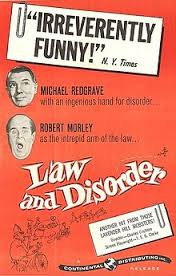
LAW AND DISORDER
UK, 1959, 76 minutes, Black and white.
Michael Redgrave, Robert Morley, Joan Hickson, Lionel Jeffries, Ronald Squire, Elizabeth Sellars, John le Mesurier, George Coulouris, Meredith Edwards, Reginald Beckwith.
Directed by Charles Crichton (and Henry Cornelius).
Law and Disorder comes at the end of the 1950s, a golden age for British comedy, especially at Ealing Studios. The people responsible for Law and Disorder included T.E.B. Clarke who wrote so many of the Ealing Studios films including Hue and Cry, Passport to Pimlico, The Lavender Hill Mob, The Titfield Thunderbolt. It was directed by Charles Crichton who also directed a number of these films including The Lavender Hill Mob. However, the film was begun by Henry Cornelius who had directed Genevieve and I Am a Camera. Crichton took over after Cornelius’s death.
The film is a star vehicle for Michael Redgrave, better known for serious roles, but enjoyably comic here. Robert Morley is a pompous judge, Joan Hickson is her usual self as Aunt Florence and Lionel Jeffries is his usual as a major.
The film is short in running time – but a very good and typical British comedy.
1. The quality of this British comedy and the fifties style and humour?
2. Black and white photography, London and country settings? Authentic atmosphere for British comedy?
3. The humour of the build up of Percy, the dates of his career, his jail sentences, his incorrigible nature, the purpose for his swindling the money? The religious irony in his missionary journeyings and his becoming a bishop?
4. Florence and her looking after Colin, the humour of Percy’s attacking her for card cheating? Her character, dishonesty, humour?
5. The importance of Colin growing up, his reputation and career, his assisting the judge, not knowing his father’s career?
6. The humour in Robert Morley’s performance as the judge? British justice and its exaggeration, pomposity, what did he learn ultimately?
7. The gallery of assorted crooks, their working combination? The London crooks with their personalities, the Major and his temptation of Percy, the various contacts?
8. The character of Percy? Michael Redgraves’s style? The honest looking crook? His retirement, the temptation to smuggle, his skill in smuggling?
9. The build-up of suspense in the presentation and the assize courts, hearing the cases, the humour of the case about the parrot, the judge and Colin Watkin and the frame up for smuggling? The reason for the judge’s change of attitude?
10. The British background of smuggling, the satire on the police and their administration of the rules as regards hotels etc., smugglers? The man who lost his case and wanted to shoot the judge as a robber? The insight into these various British types?
11. The importance for delaying the case, the devices?
12. How appropriate was the happy ending? The conversation between Percy and the judge? The judges's not letting Colin be present?
13. The themes of honesty and dishonesty, justice, the irony of the title, the all pervading British humanity within their comedies?
Published in Movie Reviews
Published in
Movie Reviews
Tagged under
Saturday, 18 September 2021 19:19
Lavender Hill Mob, The
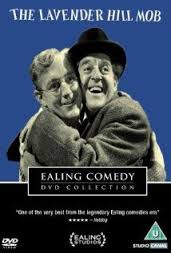
THE LAVENDER HILL MOB
UK, 1951, 81 minutes, Black and white.
Alec Guinness, Stanley Holloway, Sid James, Alfie Bass, Marjorie Fielding, John Gregson, Clive Morton, Sydney Tafler, Audrey Hepburn.
Directed by Charles Crichton.
The Lavender Hill Mob is considered one of the great classics of English cinema. It was made by Ealing Studios in its heyday. Alec Guinness performed in many of the films from Ealing Studios at this time including his eight-role performance in Kind Hearts and Coronets and The Man in the White Suit. He also appeared to great effect in The Ladykillers. He was to win an Oscar for The Bridge Over the River Kwai in 1957 – and was nominated for an Oscar for this performance.
The film is simple in its presentation of a mild-mannered clerk played by Alec Guinness and an artist played by Stanley Holloway. They dream of better things in life – and decide to plan a robbery, models of the Eiffel Tower in the gold they have stolen. However, the film is told in flashback and it is only at the end that we realise that, fleeing to Argentina, they have been caught.
The film has a very strong supporting cast including Sid James and Alfie Bass as accomplices. It is an early film for John Gregson. There is a brief appearance, striking, by Audrey Hepburn who within two years was to have won an Oscar for Roman Holiday.
The film is British tongue-in-cheek, written by T.E.B. Clarke, a veteran writer who at this time wrote a number of screenplays for Ealing Studios including Hue and Cry, Passport to Pimlico, The Blue Lamp, The Magnet, The Titfield Thunderbolt and Barnacle Bill (All at Sea), also with Alec Guinness. He wrote some more serious screenplays including the adaptation of D.H. Lawrence’s Sons and Lovers in 1960.
The film was directed by Charles Crichton, one of the regular directors for Ealing Studios as well. His films include The Titfield Thunderbolt, The Love Lottery and The Battle of the Sexes with Peter Sellers. He continued directing, especially in television, and collaborated with John Cleese in the late 1980s for A Fish Called Wanda.
1. The humour and irony of the title? Its British tone? The British style of the film? Its presentation of ordinary people in farce, satire, parody?
2. The film is considered a classic comedy. Does it deserve its reputation? Why? How excellent a comedy of manners was it, a crime comedy, a presentation of humorous characters, clever dialogue and wit, humorous sequences?
3. How important were the personalities of the stars: Alec Guinness, Stanley Holloway, Sid James? How is their impression enhanced over the years?
4. The importance and quality of the black and white photography, the London and Paris settings, the presentation of crowds, London work, Holland at work and the details of his work, the details of police work, the making of the Eiffel Towers, the police show etc.? How important was atmosphere for the whole film?
5. How clever a crime caper was this film? As a crime comedy of the fifties? The comparison with the genre of the sixties and seventies? The similarities, the differences?
6. Alec Guinness' performance as Holland? How skilful and successful? The presentation of Holland as the ‘little man’, his presentation of his history, his being taken for granted, his meekness and fussiness, his interior ambitions, the irony of his superior's comments, the threat of change? How important was the flashback structure for the film and its humour? What insight into the downtrodden ambitious little man did this performance give?
7. How did the character of Pendlebury contrast with Holland? The jovial man who was equally ambitious, without opportunity? His strengths and his fears? How much insight into this kind of character?
8. The comedy in Lackery and Wood? The way in which they were caught and conscripted for the crime? Their interaction, pressure from wives etc.? The ordinary British criminal and his sense of pride?
9. Comment on the finesse of detail in the film: the van and its work, the preparation for the crime and Holland's use of his routines, the reading of the novels to the old lady, the shouting in the public places about the safe, the trapping of the criminals, the use of shadow, the train, the robbery itself, the police show and the arrest, Pendlebury’s initial arrest and the irony of mistaken identity, Holland falling, into the river etc.?
10. How interesting were the Scotland Yard police and their reports, the continuing interest, the dawning of the truth?
11. The significance of the Paris sequences? The mistake about the letter of the alphabet, the pursuit of the schoolgirls, the exhilaration of the run down the Eiffel Tower and its impact?
12. How successful was the humour at Calais, the desperate attempts to get on the boat etc.?
13. The details of the humour in the school sequence, the getting of the towers, the girl who refused etc.?
14. Why was the police show sequence humorous? The chase within the show?
15. The skill of the dramatization of the car chase, the changing of radio messages, the visualization of the cars in motion etc.?
16. Comment on the amoral tone of crime capers, values and justice. The finale and seeing Holland handcuffed to the police?
15. Does the film deserve its reputation as a classic?
Published in Movie Reviews
Published in
Movie Reviews
Tagged under
Saturday, 18 September 2021 19:19
Laughing Anne
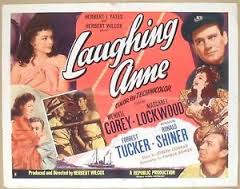
LAUGHING ANNE
UK, 1953, 90 minutes, Colour.
Margaret Lockwood, Wendell Corey, Forrest Tucker, Ronald Shiner, Robert Harris.
Directed by Herbert Wilcox.
Laughing Anne is a melodramatic story from Joseph Conrad. Robert Harris portrays Conrad telling this story and then there are flashbacks. The film was directed by Herbert Wilcox, the husband of Anna Neagle who made so many films over the thirties, forties and fifties with his wife. In a way this is an Anna Neagle role but Anne is portrayed by Margaret Lockwood. Wendell Corey is the Conrad sailor hero. This is not a particularly good film but it does highlight Conrad's themes of the sea, set in the East, and the sad lives that the outcasts of these islands live. Other versions of Conrad's novels include The Outcast of the Islands, Lord Jim and The Duellists.
1. An enjoyable sea adventure? Conrad story?
2. Contribution of colour, music, the stars? Eastern atmosphere and locations, Paris flashbacks?
3. The introduction of Joseph Conrad himself, his stories, the prologue and his telling the tale?
4. The interest and appeal of Conrad's sea stories and of the East: characters, situations, outcasts, the sea?
5. The film's atmosphere of the sea and life East of Suez, the people, style of life, problems. the sea itself and its effect on people?
6. The captain and his pride in his ship, waiting for his wife and the clash and her leaving? The 'Sunan' itself, Nobby and his humorous comments on situations? The character of the captain as an honourable man? His encounter with Anne and changing, her love of the sea compared with his wife's attitude? The various incidents in the town after his wife's departure, the encounter with Anne and her stowing away? The effect they had on each other, their child, the finale and his encounter with her and her giving her life for him?
7. How credible a character was Anne? As a singer? French, from Paris and her background, life in the Fast? The paint being taken off her face, learning to cook, becoming much more domesticated on the ship? In love with the captain and the effect on her life? Her not wanting to hurt him and so leaving him, even with the child? The effect on her life later and her decision to give the son to the captain and her death?
8. The appropriateness of the flashbacks: her songs and their use throughout the film and the Paris setting, the atmosphere of violence, easy-going people? The importance of the fight, Farrell and his influence on Anne, the temptation about the money, his decisions, his accepting the money, Anne's influence to change him, the subsequent
fight and the breaking of his hands?
9. Did the flashbacks and the encounter with Farrell explain Anne's decisions and the consequences of her decisions? Farrell and his bitterness, his attacking the ship for the gold, his hold over Anne and humiliating her, the number of deaths as consequence of Anne's decision?
10. The picture of the captain with the boy at the end and his growing up to be like his father and laughing like his mother?
11. The comic contribution of Nobby?
12. How well delineated was the character of Farrell ? the American, the fighter, Paris, Anne, the songs, the fight, the injury and his bitterness?
13. The adventure ingredients, blending with the romance ingredients, the songs? A successful blend for the film? As a representation of Conrad's story?
Published in Movie Reviews
Published in
Movie Reviews
Tagged under
Saturday, 18 September 2021 19:19
Last Voyage, The
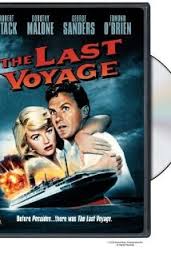
THE LAST VOYAGE
US, 1960, 91 minutes, Colour.
Robert Stack, Dorothy Malone, Edmond O’ Brien, George Sanders, Jack Kruschen, Woody Strode.
Directed by Andrew L. Stone.
The Last Voyage in its day could have been called old-fashioned melodrama. In the light of the disaster trend of the seventies, the film fits very well into that group of films. There is an explosion on a ship and the liner begins to sink. Needless to say, there are decisions to be made, suspense and fights for survival. Advertising notes that a genuine liner which was awaiting scrapping was sunk for the special effects of the film.
The film was written and directed by Andrew L. Stone who made many thrillers in the forties and fifties. In the seventies he ventured into the spectacular field of the musical with Song Of Norway and The Great Waltz. They looked beautiful but the screen plays were very limited and even made the composers, Grieg and Strauss, look somewhat silly. Stone was at his best in films like The Last Voyage which compare favourably to the disaster films of the seventies and eighties.
1. Was this an enjoyable adventure film? How strongly did it involve its audiences? What was the nature of its suspense? Successful suspense? Audience identification with characters and with the situation and danger?
2. How good was the quality of the reconstruction of the ship, the note, the disaster? The use of widescreen and colour? Did the disaster seem real or contrived by Hollywood?
3. How did this film compare with the seventies disaster films and their spectacle? It was smaller scale, but was it less successful? What were the major features of its impact? How do these compare and contrast with recent films? How successful was the voiceover commentary on the incidents? Did this add to audience involvement or take away from it?
4. Was the film successful in its main emphasis on the voyage and the disaster compared with the amount of attention given to characters?
5. Was the focus on the Henderson family satisfactory? Did this serve to help audience imagination about the rest of the characters? Could audiences identity with the Henderson family? A nice American family? the relationships amongst themselves, the setting with the Captain and his remembering their identity? The impact of sudden and unexpected disaster and audience identification with this? The suspense and feeling for the little girl on the plank, the wife, crush, immobile, thoughts of death, the priorities about dying, others on the ship, the focus of decisions, the final relief at their being saved? Was this a good technique for this film?
6. How credible was Henderson's panic? Could audience understand this? His relationship with his daughter and saving her on the plank, his panic and all the efforts to save his wife, his understanding for her plight, the expression of their love? the dance and then the disaster? Whether he should have survived or died with her? Comparing him with his wife and the feelings in such a situation? Was he right to attack the Captain and the other men? Was he right to give his wife the priority?
7. Laurie Henderson and her plight? Wanting her daughter to be saved? The temptation to suicide and her inability to kill herself? Asking for herself to be shot? Could audiences understand this? The moral issues involved? The wasted life in view of her being saved?
8. How important was the new workman? His strength in helping the men in the boiler room? His compassion for the Hendersons and his helping them without thought of himself?
9. Walsh and his ordeal in the engine room, trying to save the ship? How interesting were these sequences? How convincing in the rush and order of the manual work? The priorities of who was to be saved? Walsh's clashes with the Captain? Was Walsh in the right? The impact of his men? His concern to help the Hendersons? His skill in saving them?
10. Was the portrayal of the Captain convincing? The background of his ambitions? Was he a weak man? Did he make the right decisions? Was he more interested in saving the ship and making a show? The clash with Walsh? His death?
11. How well portrayed were the other officers? The portrayal of them at work, in their functions? In contrast with the Captain? Their critique of him? Their role in saving the passengers?
12. How interesting were the minor details of the people on the ship, the panic and the control, the lifeboats, the atmosphere of fear, the possibilities of selfishness? How important was it that the disaster happened in daylight and in calm water?
13. How important in the struggle for survival? What did the film have to may about the desperate need to survive?
14. Why do audiences like disaster films? To experience vicariously the danger? To understand people in such situations and imagine themselves? In this an enjoyable thing? A valuable entertainment experience?
Published in Movie Reviews
Published in
Movie Reviews
Tagged under
Saturday, 18 September 2021 19:19
Last Three Days, The/ Gli Ultimi Tre Giorni

GLI ULTIMI TRE GIORNI (THE LAST THREE DAYS)
Italy, 1977, 110 minutes, Colour.
Franco Lotterio, Lina Sastri, Claudio Cassinelli.
Directed by Gianfranco Mingozzi.
The Last Three Days is a very arresting film about events during the fascist era in Italy. The setting is Bologna, a young man befriends a boy and in befriending him gives him a gun, urges him to use the gun – and eventually persuades him to make an attempt on the life of Benito Mussolini during a visit to Bologna.
The film has a great deal to say about the fascist era, from the perspective of the 1970s. It recreates the scene, showing the detail of family life, especially the life of the boy and his looking at the world. He has a communist-sympathising father. He is devoted to his aunt. He has troubles and rivalries within the family. However, when he makes friends with the young man, he becomes dependent on him – and is almost brainwashed to make the attempt for the assassination. It fails and he is killed.
The film was originally a two-part miniseries on RAI, made during the period of unrest in Italy in the 1970s, just before the abduction of the prime minister, Aldo Moro and his death.
It was topical in its time – and is very interesting in retrospect.
1. An interesting film? Entertaining? For Italian audiences, non-Italian audiences? A production of R.A.I
2. Audience interest in Mussolini and Fascism? The retrospect of the seventies and the judgment of Fascism, the fears of neo-Fascist movements? The nostalgia for the past, the judgment of history, the warnings? How much was this the tone of this film?
3. The importance of Bologna as the setting? Socialist attitudes and Communist presence in Bologna? The clash with Fascism and Mussolini’s origins in the area? Bologna as a centre of clashes and its place in Fascist history of the twenties and thirties? How well did the film present Bologna of the twenties - the houses, streets, museums, stadiums? The preparations for the visit of Mussolini, processions? The colour style of the film? The Italian musical score and its atmosphere and mood?
4. The film was based on historical events but adapted? The credibility of the persons and the events? The reality of the story and assassination attempts on Mussolini? The heroism of the boy as presented by the film? The endorsement of his attempt? The comment that the fascist situation brought about havoc, madness in people's attitudes, violence? That the ordinary citizens became victims of fascist madness? The question of how necessary this was?
5. The film's focus on the boy and having the audience with him? Interest in him? His being presented as an ordinary lad in Bologna, at school, a reserve for the sports team? His belonging to a Communist-sympathising family? His brother and his attitudes, his father and the printing press, the aunt and her devotion to the cause? Seeing him in the home context, at school, with his friends? The presence of the fascist Ettore? The boy's relationship to Ettore? A boy at an impressionable age emotionally, as regards models and example, of hearing about the political situation and moral judgments?
6. The film’s characterizing him as a boy of his time - the sports, the reserves, his bicycle, friends, the detail of his life at home for example meals, clothes etc.? His girl friend and the telephone call? The party? His devotion to his aunt? The style of the domestic detail and audience interest in this?
7. The film's structure of the three days and the title reference? The preparation of Bologna for the visit of Mussolini? The growing atmosphere of joy, frenzy, fear? How well was this presented as background in the street scenes, crowd scenes, security guards, the repercussions within the family?
8. The portrait of the father, his communist sympathizing, communist newspapers? His printing work and his compromising with the fascist regime? The disillusionment for his son and the way this was presented? Its influence on the boy's action?
9. The boy's devotion to his aunt? An attractive character? Seeing her at work, her socialist sympathies? The clash with Ettore and her nephew? Her fascination for him, cinema outings etc.? The boy's devotion to his aunt and his disappointment in her, suspicion of her? How much did her behaviour influence his reaction and assassination attempt?
10. The background of the police, the security guards? Ettore and his work? His criticisms of fascism and his being an extreme fascist looking for opportunities to put down the ordinary fascists and promote his own cause? His influence on the boy's brother? His criticisms of the boy? His inviting him to the museum, knowledge of his taking the gun, understanding what was going on in the boy's mind? Tempting him with information about the gun and the bullets? His being the winner at the end? The postscript of the film about repressive laws as illustrating Ettore’s cause?
11. The portrait of the brother and the bond between the two brothers? His place in the family? The sports and gym work and the fascist emphasis on this? The rivalry between Ettore and the brother and Ettore pushing him? His indecision yet final joining of the Fascist band? The influence of this on the boy and his assassination attempt?
12. The build-up to the assassination itself, the visit to the shops to buy the bullets and the guns? The visit to the museum and the stealing of the bullets? The previous background of his taking the gun, at home? The seriousness and tension in the boy's feelings and mind?
13. The attempt itself - the party and the children dancing at the party, the contrast with the boy at the stadium and the sports events, his aunt discovering the truth and seeking him and running through the crowds? The boy and his fear, the possibilities of shooting, the crowd crescendo and his attempt?
14. Mussolini being unharmed and his reaction to the attempt? The shooting of the boy and the pathos of his death on the Bologna streets? His aunt? Ettore's presence and the irony of his cause winning?
15. The aftermath of this event - the boy remembered as hero, the repressive laws and their introduction? The audience giving emotional assent to the assassination attempt, the critical judgment on the introduction of repressive laws?
Published in Movie Reviews
Published in
Movie Reviews
Tagged under
Saturday, 18 September 2021 19:19
Last Sunset, The
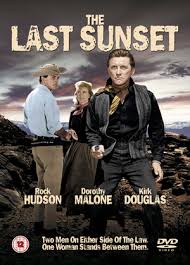
THE LAST SUNSET
US, 1961, 112 minutes, Colour.
Kirk Douglas, Rock Hudson, Dorothy Malone, Joseph Cotton, Carol Lynley, Jack Elam, Neville Brand.
Directed by Robert Aldrich.
The Last Sunset is an ambitious western directed by Robert Aldrich. Aldrich had made his mark in the fifties with westerns and thrillers including Vera Cruz, The Big Knife, Kiss Me Deadly. He was soon to change style in the sixties with the horror thrillers, Whatever Happened To Baby Jane and Hush Hush Sweet Charlotte. His films increased in scope with The Dirty Dozen, Flight Of The Phoenix and Too Late The Hero in the late sixties. He continued to make quite a number of significant westerns and thrillers throughout the seventies and into the eighties.
The screen play for The Last Sunset was written by Dalton Trumbo, one of the Hollywood Ten, who had been writing screenplays in the fifties under pseudonyms. At this time he emerged with his own name with screenplays for Exodus, Spartacus and The Last Sunset. He was to film a version of his own novel Johnny Got His Gun in 1970.
The cast of this western is very strong. Critics and many audiences considered it somewhat slow. It aims to incorporate aspects of Greek tragedy into the atmosphere of the west. Eugene O'Neill had been interested in this kind of thing and indeed there is a lot of basis for the tragic Greek confrontations in the west and the atmosphere of law and justice. The Last Sunset in always interesting in showing the possibilities for a western with hopes for seriousness.
1. The significance and tone of the title? Pessimism and death in the west? How successful a western was this? How enjoyable, the use of conventions, characters, situations? Was this a good action western? A convincing psychological Western?
2. Contribution of the colour and locations? The contribution of the actors and their styles?
3. The tone and meaning of the theme from the title and the ending? What were the main themes of this western?
4. How successfully did the film use symbols, the use of black and of white, the gunfighters, black and white outfits, the dresses? the cattle, the final shoot pits?
5. The film had parallels between Greek tragedy and the West, the law? How were they portrayed? Did the film have and atmosphere of Greek tragedy? (or is this too pretentious an interpretation?). Discuss the theme of vengeance, law, violence, vendetta. relationships, love, fate, doom?
6. Comment on the way of transferring Greek tragedy. Its styles, themes, intense world, meaning of life and death to the west? Comment on the use of the old man as a chorus, on the behaviour of the main characters?
7. In what ways was? O’ Malley a hero? A hero of the west? His first appearance during the credits, pursued, needing to hide? The importance of the explanations of his background, his shootings and killings, his relationship with Belle love in the past, neglect, relying on her, her emotions? His capacity for work? The nature of the pursuit with Stribbling after him? The significance of his anger and his throttling of the dog? His need to help him? remaining to work? The importance of his saving Stribbling? his encounter with the Indians? A better side of his character? His relationship with Dana, trying to rescue him? fatefulness of the love for Belle and for Missy? How influential was this in deciding to go to his death? Was he a sad man? his death and pathos?
8. What insight into western heroes and anti-heroes did the film give?
9. How convincing a hero was Stribbling? a match for O’Malley? Kirk Douglas compared with Rock Hudson? initial picture of his pursuit? The gradual explanations of his motives? His capacity for work? Why was he attracted to Belle? Was the love relationship convincingly portrayed? His relationship with John Breckinridge? Saved by Belle? obligation on oath? His hot-headedness with the Indian?. The significance of the final duel? The fact that he survived?
10. How strong a character was Belle? Strong enough for a focus for the two men’s emotional response to her? The realism about her love for O’Malley? Her attraction for Stribbling, her marriage to Breckenridge? Her love for her daughter?
11. How did the film portray Missy as a younger version of her mother? Prettiness, zest for life? Wanting to be a woman? Independent? The importance of the dance sequences? Her not knowing the truth? The emotional response to O’ Malley and his dashing of her hopes?
12. The importance of Breckenridge, Breckenridge as the leader of the trek, but his weaknesses in drinking, memories of war, his lies and the pathetic nature of his death?
13. Comment on the effect of the portrayal of cattle ranches, work, seasons, fiesta…,?
14. What did the other cowboys in the background add to the meaning of the film and the suspense? The role of the Indians?
15. Was the film a good one for insight into life in the West?
16. Was it convincing in portraying the west as a situation for insight, into the human condition and its deeper complexities?
Published in Movie Reviews
Published in
Movie Reviews
Tagged under
Saturday, 18 September 2021 19:19
Last Safari, The
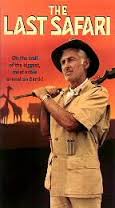
THE LAST SAFARI
US, 1967, 110 minutes, Colour.
Stewart Granger, Kaz Garas, Gabriella Licudi, Johnny Sekka, Liam Redmond.
Directed by Henry Hathaway.
The Last Safari is an entertaining adventure - which might have been much better. It is rather long and drawn out. There in attractive African photography and music by Johnny Dankworth. The direction is by Henry Hathaway. towards the end of his career. Hathaway made many interesting adventure films over several decades including the first colour western The Trail of the Lonesome Pins. During the forties he made a number of sombre black and white documentary thrillers like The House On 92nd Street and Call North Side 777. After this film he was to direct John Wayne in his Oscar-winning performance in True Grit. The Last Safari, while entertaining in a routine way, is a disappointment for a Hathaway film.
1. Audience expectations of African films? Was this just another one? Was it different?
2. The use of colour, location photography, emphasis on African animals? How well did the film establish and continue its atmosphere?
3. The importance of the modern settings planes, clubs, politics etc.?
4. The significance of the title and Its tone? The emphasis on age, regrets, heroes on safari and their achievements? Were the themes explored well?
5. The focus on Gilchrist? Seen at the start as a hunter and guide, the explanation of his attitudes on hunting and hunters, a humane man, a loner, the reasons for his feelings of guilt and responsibility, his need for redemption? His obsession with redeeming himself? The significance of his speech at the club about modern hunters? A man on a desperate quest?
6. The presentation of danger? His involvement in danger? His attitude towards the others? The question of politics? The political emphasis in the safari? Gilchrist's finally going on alone, despite the deaths? The fact that he didn't shoot the elephant? What had he achieved by the end of the safari? Did he understand this?
7. How much insight into the character of a tough hero of Africa? Strengths and weaknesses?
8. The contrast with Casey? His showing off on his arrival, his brash attitude towards the animals, his spoilt American background, Grant accompanying him? His devices of ingratiating himself with Gilchrist? His being repulsed by Gilchrist? His using tricks to pursue the safari? His gradual change of heart? What was he learning? His persistence and the need to endure, especially in the desert sequence? How did he change from being spoilt? His understanding of Gilchrist and his quest, giving him advice? What future did he have?
9. How well delineated was the character of Grant? The kept companion, the popular way of life, her yen for adventure? Her reaction to Casey, her admiration for Gilchrist? How did she change? Her involvement in Africa? As symbolized by her joining in the dance? Her future?
10. The presentation of Africa, African customs, in themselves, to be respected and understood? Casey's impulsive American response, fighting? The contrast with Grant and her involvement in the dance?
11. The presentation of the Africans as guides? Modern Africans with their primitive background and modern devices? The wrist alarm going off and stampeding the elephants? Death and the capacity for survival?
12. What insight into modern Africa and the changing world? The significance and tone of the title?
Published in Movie Reviews
Published in
Movie Reviews
Tagged under
Saturday, 18 September 2021 19:19
Last Flight of Noah's Ark, The

THE LAST FLIGHT OF NOAH'S ARK
US, 1980, 97 minutes, Colour.
Elliott Gould, Genevieve Bujold, Ricky Schroeder, Vincent Gardenia, Tammy Lauren.
Directed by Charles Jarrott.
An entertaining Disney adventure - enough for the children but entertainment also designed for the adults taking the children! This is particularly the case with Elliott Gould and the charming Genevieve Bujold. as the leads. There are two orphans on board the ark as well as numerous animals. There are also some comic Japanese soldiers - who, initially, have not heard that World War II is over. There is romance, adventure, disasters at sea before an inevitable final rescue.
Ricky Schroeder is there for the children - as well as adoring mothers! The film is an adventure with nods to the story of Noah especially in the final rescue and escape from the island. There are also echoes of all the Swiss Family Robinson, Robinson Crusoe stories. Elliott Gould worked for Disney with The Devil and Max Devlin. Director Charles Jarrott – Anne Of A Thousand Days, Mary, Queen of Scots, The Dove, The Other Side Of Midnight, also worked for Disney in the mining story, Escape To The Dark.
1. Entertaining Disney family film? The perennial popularity of this kind of adventure story - with romance and children and animals? the quality of this story?
2. The significance of the title - Noah's Ark, the flood, the animals, the sending out of birds to see whether the flood had subsided? The possibility of building a new world? The fable touch for this film?
3. The colour photography and the atmosphere - of the drab United States, the Pacific island, the sea adventure? The musical score? The special effects - especially for the plane, for the last flight of Noah's Ark? The storm, the shark, the rescues?
4. The plausibility of the plot - sufficient for a family Disney film? Dugan and his need to escape from his creditors? His skills as a pilot? Bernadette and her missionary determination to get to the South Pacific mission? The decrepit plane? The orphans and the animals? The discovery of the Japanese soldiers? Hostility, friendliness? The escape with the upturned plane - adventures and rescue? The events as larger than life for the purposes of entertainment?
5. Elliott Gould's nonchalant style as Noah? the echoes of his other films in his escape from his creditors and the chase comedy? His flying the plane? Antagonism towards Bernadette? The crash? His antagonism towards the Japanese? His falling in love with Bernadette? His reaction to the orphans? Sympathetic? Against them? His reaction to the animals especially Brutus? The energy put into the making of the new Noah's Ark? The heroics at sea? A humorous American hero?
6. Bernadette and her missionary zeal, the orphans and the farewells, the children stowing away, her upsetting the compass? The crash? Her antagonism towards Noah especially with the Japanese soldiers? Her friendship? Their working with her? The escape and the final romance? A vigorous heroine?
7. Bobby and Julie? Disney children? American clean-cut and charm? Love for Bernadette, stowing away, difficulties for Noah, their love for Brutus? The happy life on the island? Friendship with the Japanese soldiers? Building the ark? The adventures, especially with the shark and the storm? Hunger? The happy ending?
8. The portrait of the Japanese soldiers? echoes of World War II, the fears, the comic and farcical aspects of their becoming friends with Noah and Bernadette? Their collaboration on the ark ? their skills? the rescue?
9. The minor characters, especially the pursuers of Noah at the beginning, the owner of the plane and the deals about taking it? The rescuers at the end?
10. Comedy sequences? Noah's chase, the flight, the crash, settling into the island, the encounters with the Japanese, making the ark?
11. The crises and adventure, especially with the crash, the final voyage?
12. Audience response to this kind of conventional fable? heroes and heroines, good intentions? Sermons about values and the right way of living life? How successfully do the Disney films blend the moralising with the entertainment?
Published in Movie Reviews
Published in
Movie Reviews
Tagged under
Saturday, 18 September 2021 19:19
Last Frontier, The
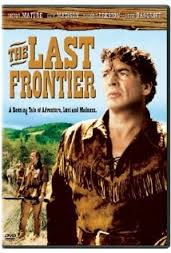
THE LAST FRONTIER
US, 1955, 98 minutes, Colour.
Victor Mature, Robert Preston, Anne Bancroft, Guy Madison, James Whitmore.
Directed by Anthony Mann.
The Last Frontier (Savage Wilderness) is an above average western of the fifties. It was directed by Anthony Mann, noted for his westerns during the fifties, especially those with James Stewart. These include Winchester 73, The Far Country, The Naked Spur, The Man From Laramie. Mann has a great critical following, especially for his action melodramas of the early fifties. During the sixties he took on some lavish projects at which he was less successful: E1 Cid, The Fall of the Roman Empire, The Heroes of Telemark. He died while filming A Dandy In Aspic. This was completed by its star Laurence Harvey. Victor Mature and Robert Preston make strong leads in this film and there is an appearance by Anne Bancroft. While the material is conventional, the treatment is strong and the themes interesting.
1. A good western? Conventional? Its reputation as a work of director Anthony Mann? A western of the fifties?
2. Contribution of Cinemascope, colour, action sequences, music, song and lyrics?
3. The picture of the west, the title, the alternate title of ‘Savage Wilderness’? The atmosphere of savagery, the atmosphere of the Indians, the Americans and their behaviour? The savage trappers Jed Cooper and Gus Mongo coming in from the wilderness and encountering the soldiers trying to spread civilization? The contrast between the
various savages and the various supposedly civilized people? The atmosphere of harmony in such a west, living with nature, surviving?
4. The film's focus on Cooper, the instinctive man, his drinking, hilarity, work, ruggedness and survival? His relationship with his friends? Women? The nature of his heroism and encountering danger? With Mrs Marsden? With his mission to the Indians? Cooper as the portrait of the instinctive man of the west?
5. Civilization at the last frontier, and in the savage wilderness? The military forts and their impact on the Indians, the idea of law and order, civilization, the guns and the enforcing of this? The officers within this community? The women? Mrs Marsden? The savagery of the civilized people?
6. The interaction of civilization and instinct in Cooper, his wearing the uniform, the ways of the army, the severe way in which people reacted to him? As a sign of contradiction for the people in the fort?
7. Marsden and his representation of order, militarism? His savagery and his reputation in the past? His sense of failure? The pent-up violence and jealousy within the man? Relationship with his wife, with Cooper, the futility of his death? His idea of rescue, his living up to orders? His reputation? A credible man of the west?
8. Mrs Marsden and the feminine presence in this outpost, relationship with her husband and attitude towards him and his career and failure, towards Cooper, her not wanting to love him that way? The contradictions in her personality?
9. Weardon as the ordinary good man, coping, following orders, heroism?
10. Gus and Mongo and their relationship with Cooper, their return, their death, the heroism of the instinctive men?
11. The portrayal of the soldiers, the officer and the fight with him? Cooper and his clash with the soldiers and his fighting?
12. The portrayal of the Indians? People who were at home in the savage wilderness? Who lived on the last frontier? The contrast and comparison with Cooper and his friends, with the soldiers?
13. A picture of the American heritage, the savagery of the history of the 19th century, fighting, survival, the heroism of the men of action and their achievement? The praise of the west, critique of the west?
Published in Movie Reviews
Published in
Movie Reviews
Tagged under
Saturday, 18 September 2021 19:19
Lisa Picard is Famous
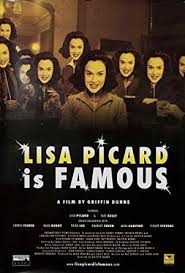
LISA PICARD IS FAMOUS
US, 2001, 90 minutes, Colour.
Laura Kirk, Nat de Wolf, Daniel London, Griffin Dunne.
Directed by Griffin Dunne.
Lisa Picard is Famous is a spoof documentary about a documentary on being famous. Lisa Picard is a young actress in New York City with great ambitions. The film follows her and her ambitions, her quests, her auditions, her getting a part in a telemovie with Melissa Gilbert. It also focuses on her personal life, her chance encounter with Sandra Bullock and her sister in a laundromat, her wanting to be famous.
She has her fifteen minutes in the public eye - but is cut from the telemovie. Griffin Dunne has directed a number of films including Practical Magic and Addicted to Love.
1. An entertaining spoof documentary, a fake documentary about making a documentary? The tradition of This is Spinal Tape and the work of Christopher Guest? The quality of this spoof, its focus on ambitions, celebrities, performances? Its being sufficiently realistic yet having the ironic touches?
2. The work of the cast and the writers, drawing on their own experiences, performances, Griffin Dunne as director of the film and his taking a role?
3. The film as a New York story, its use of the city, Times Square? Apartments, halls for auditions, Broadway, off-Broadway, off-off-Broadway? The score and its comments?
4. The opening, the focus on celebrity? The aim of the documentary? The discussions about fame? Posture, presence, the hopefuls and their collage? Lisa Picard and seeing her before she was famous? The choice of Lisa? Laura Kirk and her performance? Lisa in herself, her background and dreams, apartment, the Wheat Chex and the reaction? Offers? The Xena type of heroine? Her analysis, especially the non-verbal? The kids in New Jersey, resumes, photos? Revealing herself to Andrew? Hating the rush for the advertising audition, the reaction? To her agent, not getting the role? The television movie and its hype? The be-all and end-all of ambition? Her meeting the director, in himself, the apartment, friends, the gay issue and bursting out, the advice to Lisa, his own homosexual dilemmas? The play, acclaim, the guest spots of Lee and Sheen? The transformation, fame, café and work?
5. Her boyfriend, awkward, the television movie, proposal? The actual filming, the phone calls, her despair about its being broadcast?
6. Lisa with people, meeting Sandra Bullock and her sister, with her agent? Yet her being deflated? The business of being a star?
7. Terry, transformation, the meeting?
8. The humour in the variety of situations of people? The zip of the dialogue?
9. The director and his role, his own ambitions, the end? Her being cut from the telemovie?
10. The overall impact, an understanding of the ambitions of actors, seeing them in real life before they became famous, the struggles, the range of people with their problems? The overall impact of an entertaining fake documentary?
Published in Movie Reviews
Published in
Movie Reviews
Tagged under